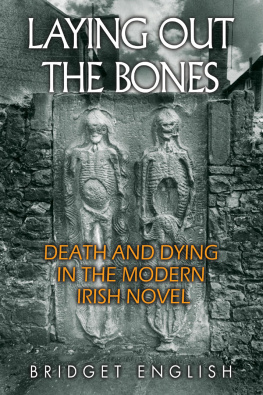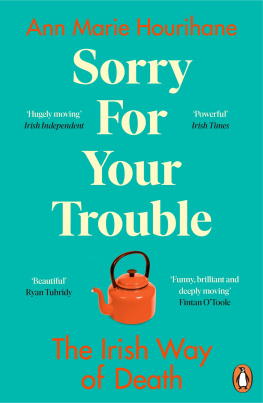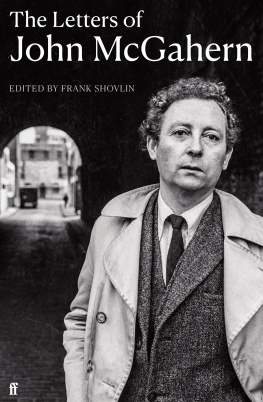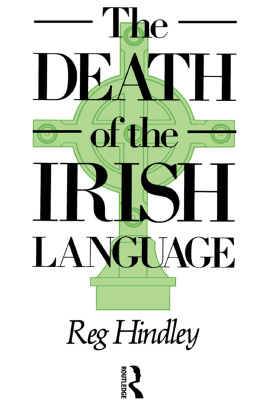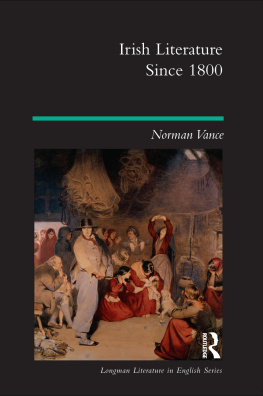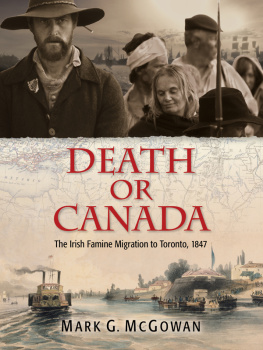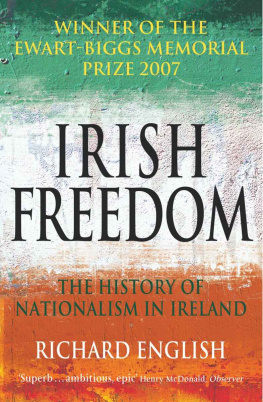Table of Contents
Guide
Page List
Bridget English holds a PhD in English from Maynooth University in Ireland. She researches and teaches Irish literary and cultural studies, modernism, and the medical humanities.
Acknowledgments
This project grew out of my research in the Department of English at Maynooth University, Ireland, where I was fortunate enough to benefit from the expertise, general collegiality, and good humor of many friends and colleagues. My thanks especially to Joe Cleary, without whose guidance and intellectual generosity this book would not have been possible and who continues to be an invaluable source of lively commentary, inspiration, and exchange. My deepest gratitude to Conor McCarthy, who likewise contributed immensely to the completion of this study and whose solidarity, advice, and support continue to be a sustaining force. Thanks also to Emer Nolan for her incisive commentary on various drafts and for her good counsel and encouragement. For their inspirational discussions and practical advice, thanks to Amanda Bent, de Corley, Michael G. Cronin, Luke Gibbons, Colin Graham, Sinad Kennedy, Tracy OFlahery, and Stephen ONeill. Special gratitude is owed to Oona Frawley, who provided sage commentary at particularly vexed times and whose insight, kindness, and friendship continue to be a much-valued resource.
Declan Kiberd not only offered his time and astute commentary in reading a draft of the book, but has also remained a constant source of cheerful encouragement and wisdom. A conversation with Margaret Kelleher provided an idea for a much-needed theoretical framework for this project, and I am grateful for her support throughout. Early feedback from Chris Morash was likewise crucial in structuring this project.
At Syracuse University Press, thanks especially to Deborah Manion, Lisa Kuerbis, and Annette Wenda for their encouragement and care with the manuscript. It has been a pleasure to work with all the staff at Syracuse, and I am grateful for their support. I would also like to acknowledge the anonymous readers for Syracuse University Press, whose rigorous, detailed reports, suggestions, and challenges were tremendously useful in revising the manuscript.
Intellectual exchanges and debates with many friends across several countries have shaped the words on these pages and have proved a sustaining source of joy over the years. My deepest thanks to Claudia Luppino, Joanne McEntee, Michaela Markov, Lauren Clarke, Matt Fogarty, Declan Kavanagh, Orla Fitzpatrick, Theresa Harney, Ciara Gallagher, Deirdre Quinn, Maggie ONeill, Alan Carmody, Marion Quirici, Feargal Whelan, and Katie Mishler. Thanks to Elizabeth Mannion for her keen editorial skills and all her help in manuscript preparation and beyond. Not only did Sonia Howell proofread parts of the manuscript, but she and John Dillon have proved endlessly generous in support of all kinds.
Finally, my greatest debt is to my family, without whose care and encouragement none of this would have been possible and whose humor relieved some of the grimmer aspects of researching death and dying. Many thanks to Joan Janis; Maureen and Mary Soldat; Dan, Gail, Daniel, Stephen, and Allison Peters; and the extended Hyland family. Colleen English deserves special thanks for her practical help, feedback, friendly skepticism, and lively debates about death. Deepest gratitude to my parents, Kathleen and Patrick English, who instilled in me a love of learning and a passion for books and whose love and support are unfailing. To them and to the memory of Rita Peters and Robert Soldat, who are not here to see the completion of this project but each of whose steadfast love and unfailing support contributed to its completion in innumerable ways, this book is dedicated.
Bibliography
Abbott, H. Porter. Beckett Writing Beckett: The Author in the Autograph. Ithaca, NY: Cornell Univ. Press, 1996.
. The Harpooned Notebook: Malone Dies and the Conventions of Intercalated Narrative. In Samuel Beckett: Humanistic Perspectives, edited by Morris Beja, S. E. Gontarski, and Pierre Astier, 7179. Columbus: Ohio State Univ. Press, 1983.
Adams, R. M. Hades. In James Joyces Ulysses: Critical Essays, edited by Clive Hart and David Hayman, 91115. Berkeley: Univ. of California Press, 1974.
Aiken, Lewis R. Dying, Death and Bereavement. 4th ed. London: Psychology Press, 2001.
Alvarez, Al. The Savage God: A Study of Suicide. London: Bloomsbury, 2002.
Anderson, Benedict. Imagined Communities: Reflections on the Origin and Spread of Nationalism. London: Verso, 1983.
Aris, Philippe. The Hour of Our Death. Translated by Helen Weaver. Oxford: Oxford Univ. Press, 1981.
Arnold, Matthew. The Study of Celtic Literature. London: Kennikat Press, 1905.
Bakhtin, Mikhail Mikhailovich. The Dialogic Imagination: Four Essays. Edited by Michael Holquist. Translated by Caryl Emerson and Michael Holquist. Austin: Univ. of Texas Press, 1981.
Barfield, Steven, Matthew Feldman, and Philip Tew, eds. Beckett and Death. London: Continuum, 2009.
Barry, Elizabeth. Beckett, Augustine, and the Rhetoric of Dying. In Beckett and Death, edited by Steven Barfield, Matthew Feldman, and Phillip Tew, 7288. London: Continuum, 2009.
Barthes, Roland. The Pleasure of the Text. Translated by Richard Miller. New York: Farrar, Straus, and Giroux, 1975. Originally published as Le plaisir du texte. Paris: ditions du Seuil, 1973.
Beaty, Nancy Lee. The Craft of Dying: A Study in the Literary Tradition of the Ars Moriendi in England. New Haven, CT: Yale Univ. Press, 1970.
Beckett, Samuel. Endgame. 1957. Reprint, London: Faber and Faber, 2012.
. The Trilogy: Molloy, Malone Dies, The Unnamable. London: Calder, 1959.
Begam, Richard. Samuel Beckett and the End of Modernity. Stanford, CA: Stanford Univ. Press, 1996.
Bell, Robert H. Preparatory to Anything Else: Introduction to Joyces Hades. Journal of Modern Literature 24, no. 3 (2001): 363499. http://www.jstor.org/stable/3831763.
Benjamin, Walter. The Storyteller. In Illuminations: Essays and Reflections, translated by Harry Zohn. New York: Schocken Books, 1968.
Benstock, Bernard. Narrative Con/Texts in Ulysses. Urbana: Univ. of Illinois Press, 1991.
Bixby, Patrick. Samuel Beckett and the Postcolonial Novel. Cambridge: Cambridge Univ. Press, 2009.
Boulter, Jonathan. Interpreting Narrative in the Novels of Samuel Beckett. Gainesville: Univ. Press of Florida, 2001.
Boyle, Robert. James Joyces Pauline Vision: A Catholic Exposition. Carbondale: Southern Illinois Univ. Press, 1981.
Bracken, Claire, and Susan Cahill, eds. Anne Enright. Dublin: Irish Academic Press, 2011.
Brinton, Daniel G. Folk-Lore of the Bones. Journal of American Folk-Lore 3 (1890): 1722.
Bronfen, Elisabeth. Over Her Dead Body: Death, Femininity and the Aesthetic. New York: Routledge, 1992.
Bronfen, Elisabeth, and Sarah Webster Goodwin, eds. Death and Representation. Baltimore: Johns Hopkins Univ. Press, 1993.
Brooks, Peter. Reading for the Plot: Design and Intention in Narrative. Oxford: Clarendon Press, 1984.
. Troubling Confessions: Speaking Guilt in Law and Literature. Chicago: Univ. of Chicago Press, 2000.
Brown, Norman O. Life against Death: The Psychoanalytical Meaning of History. Middletown, CT: Wesleyan Univ. Press, 1985.
Brown, Terence. Ireland: A Social and Cultural History, 1922 to the Present. Ithaca, NY: Cornell Univ. Press, 1985.
Bryant, Clifton, and Dennis Peck, eds. The Encyclopedia of Death and Human Experience. Thousand Oaks, CA: Sage, 2009.

